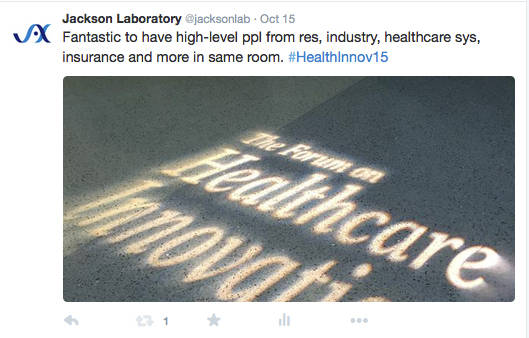As has been well documented here and elsewhere, research into the biological side of genomics is exciting and proceeding at dizzying speed. The process of translating the research to the clinic, however, can be dizzying for other reasons.
Biological complexity is the primary rate limiter, of course, as we learn over and over again that simple cause-and-effect mechanisms are seldom found in our genetic networks. But another rate limiter in the U.S. is the healthcare system itself, which is not ready to accommodate the sort of precision medicine that is becoming more feasible—at least technically—every day. Many things must change if research progress is to translate more efficiently to the delivery side. But who will drive the innovation needed to implement precision medicine? And how will it be paid for? That’s what the Forum on Healthcare Innovation, hosted last week at The Jackson Laboratory for Genomic Medicine in Farmington, Conn., is all about. What makes the forum of particular note is that the agenda is largely developed by the payers, who identified the innovations they most need moving forward and provided a framework for the other attendees.

In the U.S., with its current fee-for-service clinical delivery model, there are many barriers to change. Innovative products and diagnostics based on research findings may find payer reimbursement lagging. Doctors are not well educated in genetics and genomics and most are not prepared to employ them in their medical practices. Patient data are stored in proprietary databases within electronic medical records (EMRs) that are unable to accommodate genomic data and are not designed to share the data for patient benefit even if they did. Pharmaceutical companies are struggling to make the transition from drugs based on population averages—and sold to huge patient populations—to drugs more precisely targeted to more stratified patient subgroups. How will the new drugs and other therapies—based on research and technologies that are moving at a rapid pace and change each year—be approved and regulated? Where do mobile health technologies and telemedicine fit in? The list goes on, and to make matters worse, all of the parties involved are struggling with economic models that no longer work but will be very difficult to change.
It’s not easy to gather institutional and corporate decision makers from the insurance, medical, research, pharma, DTC genetics, genomic sequencing, diagnostics, EMR, venture capital, hospital system and other fields in the same room. But gather they did at The Jackson Laboratory, with an eye on identifying solutions to current challenges and bringing them to patients sooner and more efficiently. With the parties gathered under one roof, it was clear that the payer input enhanced the focus on what is sometimes lost in such discussions: feasibility. Change is coming and everyone needs to look forward, but speculation isn’t productive if not integrated with achievable processes and goals. The forum provided a unique opportunity to move beyond identifying challenges to forge innovative solutions.
The forum began with individual talks on related topics, focusing on personalized and precision medicine, chronic disease prevention and management, behavioral health management and connectivity and interoperability in healthcare. It’s my wheelhouse of course, but I was particularly impressed with the precision medicine talks (where else can you hear Steven Kafka of Foundation Medicine, Stephen Quake of Stanford, Jill Hagenkord of 23AndMe and David Ledbetter of Geisinger Health System speak one after the other about their perspectives on precision medicine and its implementation?) and was happy to hear major EMR vendors state the need—and describe some developing initiatives—for improved data interconnectivity moving forward.
As good as the individual presentations were, however, the panel discussions that followed were even better, dynamic and involving the kind of back-and-forth that gave the topics added dimension. Panels on emerging technology and new business models in healthcare delivery provided terrific cross-platform perspectives on the disruptive technologies that are emerging and, separately, how the economics of these changes might work moving forward. Again, my interests had me particularly attuned to the discussion that emerged in the panel on changing roles in healthcare, which included a co-founder of Patients Like Me with payers, hospital administrators and technology innovators. The panel addressed hard questions on how the fee-for-service paradigm can effectively transition to value- and outcome-based metrics while improving patient experience. The panel consensus was evident, as indicated by Chris Hocevar, President of Pharmacy Management at Cigna Corporation, who concluded: “Everyone has a desire to figure out how to get to a different state. As an industry, that encourages us to apply talent across the system to accelerate progress.”
Commenting on precision medicine can lead to fatalism from time to time, as the challenges seem intractable at times. And while talk can be cheap—agreements to agree that are later ignored are not uncommon at conferences—the presence of those at the forum and the obvious commitment to effect change across industry lines was highly encouraging. The research at JAX is all about creating potential and the ability to deliver better medical care. Involving all parties in deciding how that will actually happen is an important way to increase the impact of research in the years ahead.
Radio interviews on Pulse of the Region
JAX CEO Edison Liu chatted recently with Oz Griebel from the MetroHartford Alliance about the Forum on Healthcare Innovation.
Mark Wanner followed graduate work in microbiology with more than 25 years of experience in book publishing and scientific writing. His work at The Jackson Laboratory focuses on making complex genetic, genomic and technical information accessible to a variety of audiences. Follow Mark on Twitter at @markgenome.










